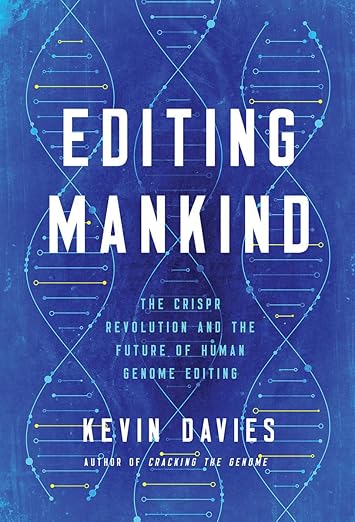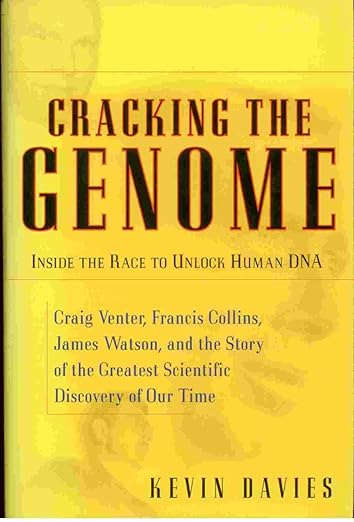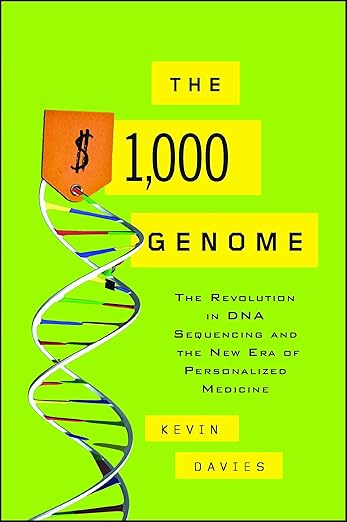
Kevin Davies
Executive Editor, The CRISPR Journal, & GEN Biotechnology and Author of The $1,000 Genome
Profile Links
Fee Range
Please contact us for pricing
Kevin Davies
Biography
Kevin Davies PhD is a British scientific editor and author specializing in the medical and societal implications of major breakthroughs in genetic technologies. His areas of expertise include gene editing/CRISPR, genomic medicine, and his latest project – sickle cell disease.
Kevin is the author or co-author of a clutch of popular science books including Cracking the Genome and The $1,000 Genome. He was invited by Nobel laureate Jim Watson to serve as a co-author of DNA: The Story of the Genetic Revolution. In 2017, he won a Guggenheim Fellowship to write a new book on CRISPR and genome editing. The result is EDITING HUMANITY: The CRISPR Revolution and the New Era of Genome Editing, published in 2020 by Pegasus Books. Kevin is a frequent commentator in the media on the medical and ethical implications of CRISPR Technology. His current book project is a biography of sickle cell disease, a sweeping account of the world’s most famous genetic mutation, from a century of structural racism to the cusp of a cure.
Kevin has spent more than 30 years in science publishing. In 1992, he launched Nature Genetics (the first spin-off journal from Nature). In 2018, he created The CRISPR Journal, the first scientific journal devoted to gene editing (published by Mary Ann Liebert Inc.) He has also served as editor-in-chief of Cell Press, the founding editor of Bio-IT World magazine, and publisher of Chemical & Engineering News.
Kevin graduated with a degree in biochemistry from Oxford University and took his PhD in human genetics from St Mary's Hospital Medical School in London. After a pair of postdoctoral fellowships at MIT and Harvard Medical School, he hung up his lab coat for the last time, joining the editorial staff of Nature. Kevin is an acclaimed public and keynote speaker, mixing cutting-edge science news woven with a distinctly British sense of humor. He lives in Washington DC.
Kevin Davies
Featured Videos
Current: Editing Humanity: The CRISPR Revolution and the New Era of Genome Editing
Kevin Davies
Featured Keynote Program
Genome Editing and the CRISPR Revolution
CRISPR is the revolutionary new technology that enables rapid, affordable and precise genome editing. After decades of progress in reading the sequence of DNA, researchers now have unprecedented ability to rewrite the genetic code of any organism. This technology has been celebrated in films, both fiction (Rampage) and non-fiction (Human Nature) and of course with the 2020 Nobel Prize in Chemistry.
Supported by a 2017 Guggenheim Fellowship, Kevin Davies is the author of the definitive book on the CRISPR saga: EDITING HUMANITY: The CRISPR Revolution and the New Era of Genome Editing, published in 2020 by Pegasus Books. As he did in his earlier books on the Human Genome Project and the consumer genetics revolution, Kevin takes the reader through the remarkable discovery of CRISPR and the key steps that turned it into a programmable "genetic scissors". He shows how this tool is already making headway in the clinic, essentially curing the first patients with sickle-cell disease.
But the technology also raises profound ethical issues about editing human embryos and the specter of designer babies. In November 2018, Kevin had a front-row seat for the bombshell announcement in Hong Kong that a Chinese scientist had created genetically edited babies for the first time, violating a sacred ethical red line. WIth dry British humor and effortless accessibility, Kevin brings to life the heroes of the CRISPR revolution, the rivalries, patent disputes, clinical applications, myriad applications in agriculture and de-extinction, and the ethical controversies. This story has extraordinary implications for medicine, science and humanity, and Davies is the ideal person to narrate it.
Kevin Davies
Featured Books

Editing Humanity: The CRISPR Revolution and the New Era of Genome Editing
by Kevin Davies
One of the world's leading experts on genetics unravels one of the most important breakthroughs in modern science and medicine.
If our genes are, to a great extent, our destiny, then what would happen if mankind could engineer and alter the very essence of our DNA coding? Millions might be spared the devastating effects of hereditary disease or the challenges of disability, whether it was the pain of sickle-cell anemia to the ravages of Huntington’s disease.
But this power to “play God” also raises major ethical questions and poses threats for potential misuse. For decades, these questions have lived exclusively in the realm of science fiction, but as Kevin Davies powerfully reveals in his new book, this is all about to change.
Engrossing and page-turning, Editing Humanity takes readers inside the fascinating world of a new gene editing technology called CRISPR, a high-powered genetic toolkit that enables scientists to not only engineer but to edit the DNA of any organism down to the individual building blocks of the genetic code.
Davies introduces readers to arguably the most profound scientific breakthrough of our time. He tracks the scientists on the front lines of its research to the patients whose powerful stories bring the narrative movingly to human scale.
Though the birth of the “CRISPR babies” in China made international news, there is much more to the story of CRISPR than headlines seemingly ripped from science fiction. In Editing Humanity, Davies sheds light on the implications that this new technology can have on our everyday lives and in the lives of generations to come.

Cracking The Genome: Inside The Race To Unlock Human Dna
by Kevin Davies

The $1,000 Genome: The Revolution in DNA Sequencing and the New Era of Personalized Medicine
by Kevin Davies
In this essential guide to the brave new future, Dr. Kevin Davies, author of Cracking the Genome, reveals the masterful ingenuity that transformed the process of decoding DNA and vividly brings the extraordinary drama of the grand scientific achievement to life.
In 2000, President Bill Clinton signaled the completion of the Human Genome Project at a cost in excess of $2 billion. A decade later, the price for any of us to order our own personal genome sequence—a comprehensive map of the 3 billion letters in our DNA—had already dropped to just $1,000.
Dozens of men and women—scientists, entrepreneurs, celebrities, and patients—have already been sequenced, pioneering a bold new era of personalized genomic medicine. The $1,000 genome has long been considered the tipping point that would open the floodgates to this revolution.
How has this astonishing achievement been accomplished? To research the story of this unfolding revolution, critically acclaimed science writer Kevin Davies traveled to the leading centers and interviewed the entrepreneurs and pioneers in the race to achieve the $1,000 genome. Davies also profiles the future of genomic medicine and thoughtfully explores the many pressing issues raised by the tidal wave of personal genetic information.
Frequently Asked Questions
How do I book Kevin Davies for my event?
- Availability Check: Contact us with your event date and budget to verify if your desired speaker is available.
- Hold Date: We place a temporary "hold" on the speaker's calendar while you finalize internal approval.
- Contracting: We issue a contract outlining the fee, cancellation policy, and event expectations.
- Logistics: Once signed, our event management team handles all travel booking, itinerary, and AV requirements.
Why should I partner with Premiere Speakers Bureau rather than contacting speakers directly?
What makes Premiere Speakers Bureau unique compared to other agencies?
How does Premiere Speakers Bureau's 'Zero Cost Service' model work?
How are speaker fees structured, and what is typically included?
What are the standard policies for speaker travel and expenses?
Kevin Davies's Featured & Related Topics
Find Similar Speakers Healthcare
Popular Speakers

Dr. Ben Carson

Deion Sanders

Daymond John

Valorie Burton

Ryan Leak

Earvin “Magic” Johnson

Liz Bohannon











